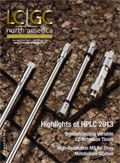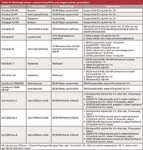Peaks of Interest
The American Chemical Society (ACS) has named Daniel W. Armstrong, professor of chemistry and biochemistry at the University of Texas (UT) Arlington, to its 2013 Class of Fellows.
Daniel W. Armstrong Joins ACS 2013 Class of Fellows
The American Chemical Society (ACS) has named Daniel W. Armstrong, professor of chemistry and biochemistry at the University of Texas (UT) Arlington, to its 2013 Class of Fellows. An editorial advisory board member of both LCGC Europe and LCGC North America, Armstrong will join 95 other ACS members to be honored at an induction ceremony at the 246th ACS National Meeting.
The ACS cited Armstrong as the "father" of pseudo-phase separations — a type of chromatography that lowers costs, volatility, and toxicity while providing higher selectivity than other analytical methods. The award citation recognized Armstrong's "central role in the enantiomeric separations/chiral recognition revolution" and his achievements in characterizing and synthesizing ionic liquids. E. Thomas Strom, adjunct professor of chemistry at UT Arlington, nominated Armstrong for the honor, praising his ability to communicate. Strom commented: "Chemists who focus on achieving a high status research programme often forget their obligations to grow and nurture the profession. Dan has not forgotten his debt to chemistry." He added, "He exemplifies the type of person who ought to be an ACS Fellow."
In addition to coauthoring over 550 publications, Armstrong has also founded a syndicated National Public Radio (NPR) show on science titled "We're Science" that was broadcast on more than 140 NPR stations and the US Armed Forces Radio Network.
UT Arlington President Vistasp Karbhari said: "Dr. Armstrong's incredible body of work represents the epitome of the research excellence and trailblazing dedication we encourage our students and professors to aspire to." He added, "His recognition as a fellow is exceedingly well-deserved."
Thermo Fisher Scientific Opens Pesticide Analysis Center of Excellence in UK
Thermo Fisher Scientific (San Jose, California) has established a new Pesticide Analysis Center of Excellence (COE) in Runcorn, UK. The center is a new resource available to government and industrial laboratories looking to improve methods for the monitoring and measurement of pesticides in the environment.
The center is modeled after the Persistent Organic Pollutants (POP) Center of Excellence in Bremen, Germany, which was established for the improvement of POP analysis in the environment, food, and animal feed. The centers have been created to provide high-productivity analytical workflows, including expert consultation, instruments, software, sample preparation, and consumables.
Paul Silcock, Thermo Fisher Scientific marketing manager and member of the new COE, said: "Our company's ongoing mission is to enable our customers to make the world healthier, cleaner, and safer, and the ability to detect and measure pesticides is critical to this effort." He added, "We consolidated a considerable amount of expertise, instrumentation, and other resources within the center of excellence to make them highly accessible to the environmental and food testing community."

New TRC Facility Accelerates Innovation and Delivery
April 25th 2025We’ve expanded our capabilities with a state-of-the-art, 200,000 sq ft TRC facility in Toronto, completed in 2024 and staffed by over 100 PhD- and MSc-level scientists. This investment enables the development of more innovative compounds, a broader catalogue and custom offering, and streamlined operations for faster delivery. • Our extensive range of over 100,000 high-quality research chemicals—including APIs, metabolites, and impurities in both native and stable isotope-labelled forms—provides essential tools for uncovering molecular disease mechanisms and exploring new opportunities for therapeutic intervention.
New Guide: Characterising Impurity Standards – What Defines “Good Enough?”
April 25th 2025Impurity reference standards (IRSs) are essential for accurately identifying and quantifying impurities in pharmaceutical development and manufacturing. Yet, with limited regulatory guidance on how much characterisation is truly required for different applications, selecting the right standard can be challenging. To help, LGC has developed a new interactive multimedia guide, packed with expert insights to support your decision-making and give you greater confidence when choosing the right IRS for your specific needs.

.png&w=3840&q=75)

.png&w=3840&q=75)



.png&w=3840&q=75)



.png&w=3840&q=75)










